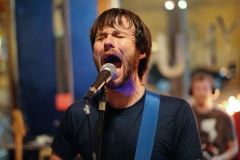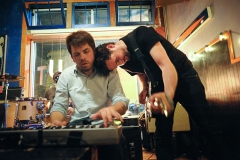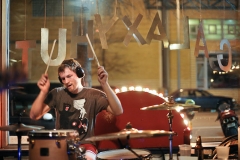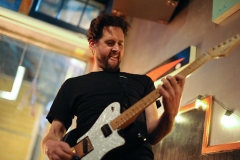An Interview with Dismemberment Plan
 by Julia Strange
by Julia Strange
February 1, 2011
“We’re the Dismemberment Plan from Washington, DC.” On the opening night of their first tour in over seven years, the Dismemberment Plan proved that they could still whip a hometown crowd into a delirium when front-man Travis Morrison grinned and greeted the audience with his traditional opening salutation.
For anyone with an Internet connection and a penchant for music blogs, it shouldn’t be surprising that anticipation for these reunion shows hit a fever pitch by mid-January. Considering that the Dismemberment Plan has a notoriously rabid fan base and that, outside of a few reunion shows in 2007, the band hadn’t played together since their break-up in 2003, this level of excitement was expected. Articles appearing in Pitchfork, The Washington Post, SPIN Online, numerous local blogs, and even NPR’s Morning Edition served as bookends to an incredible opening weekend of music at DC’s Black Cat and 9:30 Club.
These shows, arranged to coincide with the vinyl reissue of the band’s seminal album Emergency & I, were not simply an exercise in nostalgia. While there is no doubt that the shows doubled as a reunion for fans from across the country, there were plenty of show attendees who were probably still lining up for recess when Emergency & I was released in 1999. It goes to show that the Dismemberment Plan’s brand of alternately frenzied, off-beat, melodic, and dance-inducing weirdness still resonates for a lot of people, both socially and emotionally. Their music looks unflinchingly into all the messiness, awkwardness, and beauty that life has to offer, dabbles in sentiment without becoming sentimental, and like so much great art, tirelessly searches for answers to unanswerable questions that no one thought to ask.
Over the course of this past week, I attended three of the Dismemberment Plan’s DC shows, ranging from an intimate secret show for friends and family to a sold-out crowd at the 1,200-capacity 9:30 Club. These shows brought both waves of reminiscence and a pleasant realization that, despite the seven-year interlude, the Dismemberment Plan is still one of the most energetic, musically tight, and playfully irreverent live acts you’ll ever see.
In early January, I caught up with Travis Morrison by phone to see how the band’s final weeks of preparation were going.
The Fiddleback: What would you say has been the biggest change in your life since the band was last together?
Travis Morrison: I turned 38. And, oh yeah, I just grew a beard.
The Fiddleback: Really?
TM: Yeah, I look pretty good (laughs).
The Fiddleback: Are you going to keep it for the shows?
TM: I don’t know, we’ll see. The reaction has been uniformly positive, and it kind of blew my mind because I thought at least some people would be like “you look terrible, what are you doing?” But it’s kind of shocking how many people seem to like it. In fact, I’m usually told “you know, I really don’t like beards, but I really like what you have there.” I don’t know, maybe every show I’ll have a different facial hair configuration and the last one will be clean-shaven. What a great way to customize the shows.
The Fiddleback: Besides the beard, what else have you been up to?
TM: Well, I work at Huffington Post; I’m in charge of commercial programming. I’m singing in a church choir up here, and I have a duo that I make music with occasionally, a band called Time Travel. And other friends I just kind of get together with and play things like Hank Williams songs or Rolling Stones songs. Otherwise, just keeping myself amused with living in New York, which is enough to keep you busy.
The Fiddleback: What does Time Travel sound like?
TM: It kind of sounds like Beyoncé (laughs). It’s drums, as well as samples that the drummer also triggers, he’s really good at playing other equipment while playing drums. And then I play bass and sing. Structurally it’s like the White Stripes but then the soundscape is like Beyoncé, that’s the only way I can describe it.
The Fiddleback: So, after seven years, what inspired this reunion tour?
TM: We’re putting out a vinyl reissue of one of our records, Emergency & I, and we were asked to play some shows to promote it by the people who are putting it out. It’s a pretty luxurious package, it’s a double-vinyl with liner notes and a collage of photos and all kinds of stuff. So at first we were kind of like, “Yeah, we should do a few shows,” and then it became a process of feeling out what was fun and what wasn’t fun, and we ended up with the offers we had. I was a little surprised it went this far. I kind of figured we would just play some shows in DC, but it seemed like everyone was enjoying the idea, so why not go with it.
The Fiddleback: Will you be approaching this tour any differently than tours from earlier in your career?
Some songs don’t age too well because the lyrics are very young sounding. Some are very accusational. That’s a hard feeling to maintain as you grow older unless you’re kind of batshit in a way. You realize you weren’t put on this earth to bicker with people about the same thing for fifty years.
TM: Well, my approach to tour then was to make sure that I had enough socks, like I didn’t really have an approach. My life was one long road trip, if you know what I mean. So you were just constantly saying, “Oh, I’m out of socks, I need more socks.” So that wasn’t really an approach. I think some things are different. I think we’ve taken a breath and tried to handle some of the administrative aspects differently than we used to. Back in the day there was much less information available and we were just guessing about how many t-shirts to order, you know, that kind of boring stuff. Part of the administration is more a collective wisdom and a chance to take a breath and plan it a little better. Whereas back in the day it really was “I want to get in the van and drive around,” like it was almost impulsive. So I’d say that’s the biggest difference, but it’s not like there’s going to be a horn section and backup singers.
The Fiddleback: In terms of Emergency & I, this is an album that you recorded over ten years ago at this point, and you’ve probably played it more times than you can count. How do you feel about this album now? Does it feel nostalgic? Have the lyrics grown over the years to mean new things to you?
TM: I think it’s really good. I did a little thing that I very rarely do, which is to go back and listen to all the records and see what I thought of them. Generally, I’d say the middle two of our records (The Dismemberment Plan is Terrified and Emergency & I) are the two I feel warmest about. Some songs don’t age too well because the lyrics are very young sounding. Some are very accusational. That’s a hard feeling to maintain as you grow older unless you’re kind of batshit in a way. You realize you weren’t put on this earth to bicker with people about the same thing for fifty years.
The Fiddleback: Are there specific songs you’re thinking about?
TM: Yeah, like “What Do You Want Me To Say” is kind of a drag now. Unfortunately, a lot of the songs I’m thinking about are really popular, like “Time Bomb.” The stuff that I think is kinder, or maybe more open, still resonates. I think “The City” is still beautiful. “Spider in the Snow” is now one of my favorite songs in the whole catalogue. I just think it’s an amazing song, and I don’t quite understand why it’s not more beloved. I really like “Gyroscope.” It’s funny, and it paints a pretty known picture. So, I think it’s a relief that I’m able to go back to songs that I wrote when I was 24 or 25 and not see that I was too much of an asshole. It’s kind of a miracle. You know, Mick Jagger can’t stand to sing “Under My Thumb,” he thinks it’s just the jerkiest song ever. I think he’s got far more jerky songs than that, so I’m not quite sure why that’s the evil one. But I can relate to Mick Jagger in this way because I get it, like “that song’s a drag, what was I whining about?” That’s really the divide. If a song has a good heart and has a lot of energy, I find that I still really like it. By those two standards, I think the middle two records are my favorites. Emergency & I obviously is much better crafted, much better put together than [The Dismemberment Plan is] Terrified, but for my ears, I don’t really care about the craft anymore. Now it’s just the songs that have the spirit I can get with. But by the end of the record I have a headache. It’s really intense. As a band, we were never really able to learn how to breathe and lay off the gas and relax and, you know, so some bands are stuck in 5th gear, and we were one of them. And that’s cool.
The Fiddleback: I think that earned you a lot of fans.
TM: Yeah, I think that’s true. Fans that are stuck in 5th gear too.
The Fiddleback: Absolutely. Speaking of fans, are any people you haven’t spoken to in a long time coming out of the woodwork?
TM: You know, the people that we made personal bonds with while in the Plan, with a couple of really sad exceptions, really had our backs in our post-Plan life. So I think, by and large, we attracted a really solid crew of people who were interested in us as people as well as a somewhat successful band that would be good to know. Certainly at our age, you get friends who, by the last couple years of the Plan’s life, their lives were lead out of nightclubs and now they have two kids. It’s crazy; it’s awesome, you know? So we’ll have onesies on the merch table just for them.
The Fiddleback: Have you interacted with fans that you could describe as “second wave” fans who discovered you guys after you stopped touring and moved on to your other projects? Have you heard from people who are like, “I just discovered you and this is incredible and where was I back in 2000?”
TM: Yes, all the time. I mean, some of these people, their problem was that they were 12, they couldn’t got to the shows, they couldn’t have known about the band. Also remember, the rise of resources available now to scope out the history of recorded music is just mindboggling. Music is the number one art form that I think that’s benefited from the Internet. Maybe movies are number two, fashion is probably a real beneficiary as well, but music is easily number one. There wasn’t a Napster to trade screen shots of Jasper Johns paintings, there’s a Napster for music. I think once everyone got acclimatized with what to do with music, and it took a while, there was kind of a middle stretch there where opinion-makers had this kind of insane sway because nobody really knew what to listen to and found it very overwhelming. From this, a generation of astoundingly sophisticated music-listeners has come up. I mean, they’ve heard everything. It kind of blows my mind. So, they just discovered us, and are like, “Man, where was I,” but they’re also discovering obscure Athens, Georgia bands that opened for REM in the 1980s and are like, “Where was I then, too.” And I think that we put out four really interesting records with some pretty indisputably great songs. I think that it did empower people to find some of these things and say, “Wow, here’s a real body of work,” modest as it is. So, it’s been gratifying, but I think that it’s part of a larger shift in terms of a certain kind of gourmand of music history that has been really empowered in the last couple of years by technology.
The Fiddleback: If you could have any band come out of retirement or get back together to do a reunion show, who would that be?
TM: Do we have to limit it to coming back and playing old songs? Because there are some people who I think are not done making music, but they’re acting like they are.
The Fiddleback: Sure, I’d be curious to hear what you think about that.
TM: Oh, that’s easy then. I can tell you who I think is not done, but has disappeared. It’s the guy who was the brains behind Talk Talk, [Mark Hollis]. Talk Talk has a couple of hits that sounded really different, like the song “Talk Talk” is synth-pop, and they had a couple of alterna-hits from an album that was very organic sounding. Then they very famously, at the height of their popularity in England, went off the rails and did these two extremely avant garde, not song-based records. It was the early 90s and they just got horribly trashed for it. The things is, if you listen to the last two [Talk Talk] albums, Spirit of Eden and Laughing Stock, you’d think “Radiohead, Tortoise, okay.” The totemic, alternative rock bands of the aughts all were basically just staring at the last two Talk Talk records. [Laughing Stock] is the closest I think rock has ever gotten to the magic I get from mid-period Miles Davis where it’s completely beyond structure. It’s completely organic and one-of-a-kind, and also completely beautiful. It’s one of the few instances of abstract music making that really is incredible to me. Then, I think he was in his mid-to-late-30s and then he bailed. I’m sure he makes a lot of money from his residuals. But I wish the guy would come back and completely take over avant garde composed music. He could be Stephen Reich or Philip Glass if he wanted to. He could be one of those rare instances where someone has a first life as a pop musician and is like, “See you, suckers”. If he did that, if he came back and said, “I’m not playing ‘It’s My Life,’ I’m going to do 20-minute insane compositions for radio noise” there would be a certain world that would cry in joy, and I would definitely be one of them.
Photos by Jeffrey Martin



